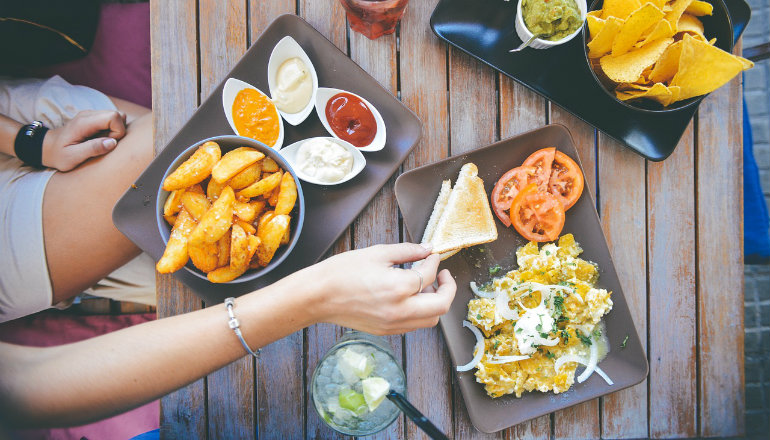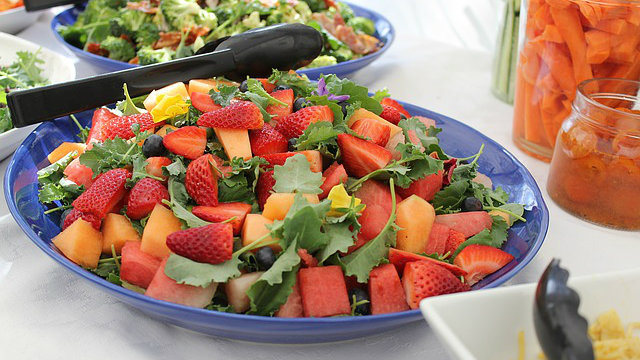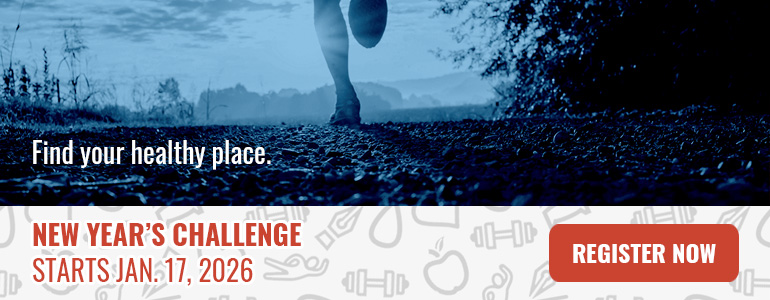 Reading Time: 5 minutes
Reading Time: 5 minutesI looked at the food truck menu, trying to find something to order. I had just started the Whole Life Challenge and was attending an event at my kids’ elementary school. Hamburger, no. Tacos, no. Ahi poke salad — that could work.
I approached the window.
“I’d like an ahi poke salad, no wonton chips please. Also, can you tell me what’s in the dressing?”
The woman looked up from her notepad and fixed me with a glare.
“Um, so I’m doing this health challenge,” I said. “And I wanted to make sure the dressing didn’t have any sugar, so…”
Epic eye roll. And then, “I’m just going to give you the dressing on the side.”
“Sure, that’s fine,” I replied.
Here’s the thing. Nobody cares about your food choices. Actually, it goes further than that. People hate hearing a litany of the food you aren’t currently eating. It’s boring, it sometimes stirs up feelings of guilt or defensiveness, and it’s a little narcissistic.
How, then, do you pursue a healthy life and remain Whole Life Challenge compliant without driving your friends crazy?
Wait to Be Asked
It’s exciting when you embark on a new healthy living challenge. You’re energized and inspired, and you want to share your enthusiasm with everyone you meet.
Resist that temptation.
Of course you should share your new commitment with family and close friends. They will be your support and allies, and it’s important to have their buy-in. You don’t, however, need to tell the woman taking orders in the food truck about your amazing new way of eating.
Whenever possible, just carry on with your new habits and don’t elaborate unless someone asks. If a friend asks, “Why aren’t you eating the bread on that sandwich?” answer the question, but focus on the healthy habits you are establishing, and all the food you are eating. Be careful not to suggest this is the only way to eat. That carries with it the implicit message that others around you are doing it wrong. If they seem interested, absolutely continue the conversation, but if not, drop it.
Social occasions can be tricky waters. If you are attending a party where you suspect there won’t be any WLC-compliant food, offer to bring a dish. If you aren’t drinking, arrive with bottles of sparkling water to share. The secret, again, is to not make a big production of your eating habits, just take care of business and come prepared.
It’s Not Just About Food and Exercise
One reason so many people are skittish about hearing about your new way of eating is we’ve all been subject to listening to the details of someone’s new diet or exercise routine. It’s well-trod ground.
Not so common is hearing about how you are making an effort to reach out to a friend, practice a daily ten-minute digital detox, or learn to play guitar.
The idea of healthy living being about more than diet and exercise might be a new — and inspiring — concept to people. I started meditating after hearing a friend talk about her meditation practice. Concepts or practices that might seem unfamiliar become more accessible once you know a friend has tried them.
Conversation vs. Monologue
Last week a friend came up to me and said, “Hey, I’ve been wanting to ask your opinion on something. What do you think about essential oils?”
I’ve spent years researching and writing about nutrition, fitness, and wellness. Spend that long with a subject and you’ll inevitably develop strong opinions. I spent the next ten minutes telling her the science I’ve read on the subject and how there’s no evidence to support the majority of the claims. Essential oils smell good, and it’s always helpful to slow down and unwind, I told her, so perhaps there’s some benefit there.
I finished talking and she paused before saying, “I guess I just believe in magic.”
Even when someone asks your opinion, they likely don’t want to hear everything you know about the subject in one breathless monologue. A back and forth would have helped in this situation.
“What do you want to know?” I could have asked, “Are you interested in the science I’ve read about the subject?”
We all like to be experts, but the truth about nutrition and wellness is there are many ways to achieve the same goal. It’s tempting, when you’ve found a solution that works for you, to assume it will work for everyone. It’s okay to tell your friends how your nutrition plan is working for you, but try to avoid presenting it as the only path to health. Be open to other ideas and wellness strategies.
Unless someone tells you the ideal diet is based on soda and fast food, because that’s just wrong.
Review: How to Talk About the Whole Life Challenge
- Don’t be a health evangelist and avoid making your food restrictions the center of attention.
- Do share some of the Well-Being Practices you are trying. Everyone has heard about a friend’s new diet or exercise program, fewer have heard about a digital jar of awesome.
- If someone does ask you about the Whole Life Challenge, make sure your answer is a conversation, not a monologue. Remember, just because you’ve found a program that works, you don’t have all the answers.









